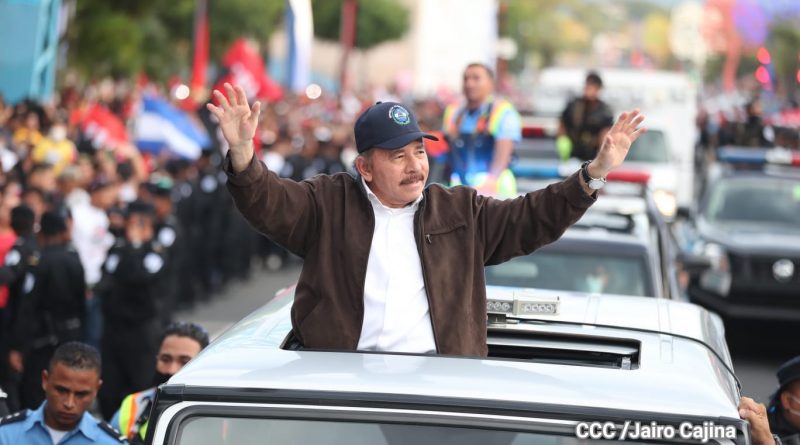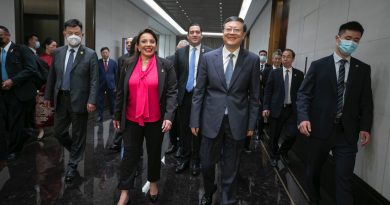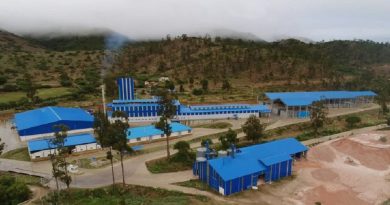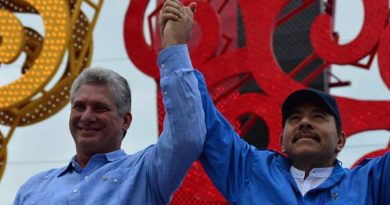The Sandinista Revolution Today: Interview
The Sandinista Revolution in Nicaragua, one of Latin America’s most important revolutions, marked its 42nd anniversary on July 19th. Kawsachun News spoke exclusively to Silke Pérez, a member of the Association of Rural Workers (Asociación de Trabajadores del Campo – ATC). We discussed the past and present of the Sandinista Revolution and the challenges that lie ahead this year which sees the country head to the polls for presidential elections, these elections are being held amidst threats of sanctions from the United States and three years on from an attempted coup by the right-wing opposition.
What were some of the most important messages from last night’s celebration?
We celebrated 42 years of our Popular Sandinista Revolution, people flocked to Plaza de la Revolución to hear the Comandante speak. As reported by Kawsachun News, the number of people was impressive, with vigils beginning on July 18th in every neighborhood to bring in the anniversary of the 19th. Then on the day, Comandante Daniel Ortega gave his speech which gave an enormous boost of confidence to the people of Nicaragua because this is crucial, not only for the defense of the Revolution, not only for the defense of our rights that have been won through the Revolution but also because it’ll be a year where the people will exercise their right to vote and deal a blow against imperialism. The polls show that the Sandinista Front (FSLN) is winning and so it’ll be a blow against imperialism that is attacking our brother countries such as Venezuela, Cuba, and Bolivia. It will also prove the will of the people in Nicaragua, which is important because in foreign media they portray our country as full of violence etc. but what we say yesterday was the joy expressed in the streets, one of our comrades from Paraguay who was an on a visiting delegation here said; I’ve only ever seen mass joy once in Paraguay, and I replied that in Nicaragua, every 19th of July is a moment of mass joy because the FSLN is the only organization that has managed to fulfill people’s hopes and raise living standards in both urban and rural areas
Tell us a bit about the triumph of the Sandinista Revolution 42 years ago.
Our revolution was won in 1979. However, it was a process that took years, the FSLN was founded in 1960 and the underground struggle goes back much further, it goes back to the struggles of Sandino and his vision of an anti-imperialist and internationalist struggle. Sandino was the one that organized rural workers, primarily in the north of the country, to defend people’s rights and to defend national sovereignty because at that time there was U.S. military intervention here. Sandino organized against this, at first with just 30 men. He was then assassinated in 1934 by the National Guard which was an organization funded by the US government, and that was the start of a dictatorship that lasted for over 40 years. That period was marked by a high level of poverty and inequality, the mass of small farmers held less than 5% of the land, 95% was in the hands of big landowners who were allies of the Somoza dictatorship. My organization the Association of Rural Workers, was founded in 1975 to support the underground Sandinista struggle at the time, we formed secret committees of rural workers everywhere so to organize people, after years of struggle we arrive at the triumph of that revolution in 1979, which is the turning point not only for our country but for all of Latin America.
When there was the attempted coup in 2018, those who supported it called it a revolution, but it wasn’t. A revolution is a transformation in thinking, it’s not a struggle that lasts a couple of days, it’s not a struggle that receives millions in funding. The transformation we led permitted victories such as the national crusade for literacy. From the triumph of the revolution to 1990, agrarian reform was carried out, a restructuring of land ownership, more than 300,000 families gained access to land where they didn’t have it before. Another important point made by our Comandante yesterday was that in 1990 the right-wing led by Chamorro won, and during those 16 years, many big landowners who fled the revolution returned to Nicaragua and demanded their old lands back. Therefore, one of the most important policies after the return of Sandinismo after 2006, was the granting of over 15,000 land titles to smallholders precisely so as to ensure the right to land isn’t denied as it was during the Chamorro period from 1990 to 2006. The Sandinista revolution is for the Nicaraguan people but also for all the peoples of Latin America.
Women have taken a leading role in the Sandinista revolution, how is that issue understood within Nicaragua?
Absolutely. One example is that the Twitter account of the UN Women’s agency recently posted, then deleted, that Nicaragua is ranked 5th in the world for women’s equality. That’s a crucial victory for Nicaragua. The participation of women in the revolution is strategic, the Sandinista Revolution realized this when we had the war of aggression in which the US-financed the Contra. During that war, the men went to battle and abandoned the centers of agricultural and industrial production, so there was a need for women to step up and fill those roles where they hadn’t before. Now, in this second phase of the Revolution, it continues to be a priority. Within the government, all the institutions have to employ 50% women, the same parity is required for candidacies of political parties at election time. These rules are enshrined by law, it’s not a guideline, it’s the law. This also applies to senior positions, if a man is President then a woman must be Vice President and vice versa. This has meant that women have many more opportunities, it has also meant that more public policy is focused on women since women are in positions of power.
2021 is also an electoral year in Nicaragua. Are November’s presidential elections being carried out under the shadow of U.S. intervention?
The 7th of November we have presidential elections. Personally, I think that the most difficult challenges for the FSLN are in the international sphere, especially in the hegemonic media outlets which influence global opinion. The challenge for the FSLN is there. Within the country, the overwhelming public support for the FSLN is there and I’m certain that these elections will be carried out peacefully. People will elect their representatives in an atmosphere of calm. Today I read in some foreign outlets that Comandante Ortega called for violence when he said that ‘a people that are armed will never be quashed’. Those sorts of headlines are a big challenge for us because these media outlets reach the whole world. It then has an international effect on issues such as sanctions. However, the Sandinistas will stand firm, our people have already faced an economic blockade, in the 80s, which triggered hyperinflation similar to that occurring today in Venezuela. The older generation lived through that, and what people say in the streets is that it won’t reach that level, because it was very serious then, we experienced hyperinflation and armed conflict at the same time. Despite all this, within the country, we’ll carry out these elections in peace, but at an international level, god knows what type of headlines there will be. Those who visit Nicaragua will be able to see that this is a peaceful country. As someone who lives here, I sometimes look at foreign headlines and I think; who wrote that! Because the reality is so different from what they want to show abroad. We’re not the only ones to suffer this type of attack, everyone who resists imperialism faces the same, everyone who is opposed to being the backyard of the U.S.
A number of right-wing figures have been arrested in Nicaragua, foreign media portray it as an act of authoritarianism, but how is the issue seen within the country?
I think there are 21 people who have charges against them right now, none of them are candidates or pre-candidates in the presidential elections, perhaps they were hoping to be but none of them had registered for anything because they aren’t leaders of any political parties, they certainly don’t have an active base which one would need to be a pre-candidate. All of these people being charged are referred to in foreign media as ‘opposition leaders who’ve been jailed by Ortega’ but look, no one has come out to protest for these people. If they had an active base of support, there would be mobilizations. However people aren’t even talking about them anymore, it’s happened and people have moved on. That’s a sign that they don’t have support. Imagine if Daniel Ortega was jailed, people would fill the streets to protest.
These 21 people haven’t been arrested because they’re opposition, they’ve been arrested for breaking laws, laws which exist in every country, I’m referring to laws against money laundering. Most of these people have NGOs that grew rich during the neoliberal period, ONGs here receive millions of dollars in funding, primarily from the US. When their accounts were looked at, the official accounts were empty, however, the personal accounts of its directors had millions, some had $7 million, others had $10 million. The corruption was enormous. This is why they’re being charged, not for being oppositionists, there are plenty of opposition parties, 17 different opposition parties are participating in the November elections.
These people broke the law, do these laws not exist in other countries? The U.S. has its own foreign agents law. If the people being charged were political leaders, then people would be in the streets to defend them.
Thank you for your time, is there any last message you’d like to leave for people here in Bolivia?
Thank you for granting us this space, our regards to the Bolivian people who have suffered something similar to what we suffered in 2018. However, we continue to organize, because that’s the most important thing, to be organized in our communities, in our neighborhoods, in our municipalities. That is the only way we can defend our sovereignty, the only way we can defend our natural resources. In the name of Nicaragua, in the name of the Sandinistas, I send my greetings to the Bolivian people.



